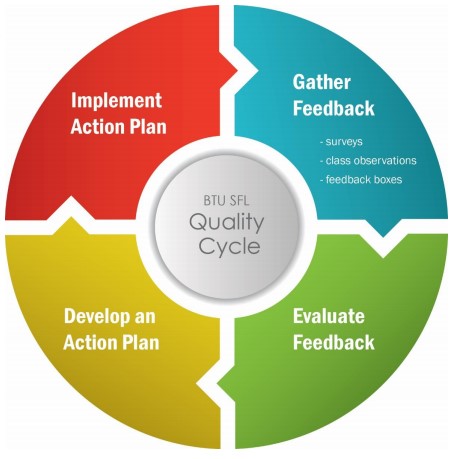
Quality Assurance Policy
The SFL implements action plans to assure and maintain the quality of its educational programs. Once the SFL identifies a problem, it conducts research and collects data concerning the problem area. Upon analyzing the data, the SFL acts to solve the problem. As action plans are cyclical by nature, evaluations are conducted regularly to ensure that amendments and improvements are implemented as needed. (Eileen Ferrance Themes in Educatıon: Action Research, Brown University, 2000, p.9-16.)
The SFL implements action plans with respect to curriculum development, assessment, staff training, and complaint procedures. To ensure the quality standards of the EPP, the SFL implements a three-prong approach to teacher evaluation and
feedback through the use of surveys, class observations, and anonymous feedback, each of which contributes to the quality cycle of the SFL. After feedback is gathered and evaluated by the SFL management, action plans are developed and implemented for the continual improvement of the education programs provided by the SFL. The quality cycle is represented by the figure below:

The SFL applies surveys to evaluate the teaching performance of its academic staff, in line with its quality assurance standards. The SFL requests students to complete instructor evaluation forms at the end of each quarter. The surveys are completed by students on the automation system at the end of each quarter, prior to receiving their final grades. The surveys consist of two parts: the first part evaluates students’ opinions of instructor performance, and the second part is concerned with course materials and content. The aim of the surveys is to assess both the performance of the staff and the students’ perceptions of the education system. The results contribute to the quality cycle of the SFL.
In addition to survey feedback, the SFL management observes the instructors’ classes from time to time as part of the quality cycle. These observations may be scheduled or spontaneous. The SFL considers teacher observations not only to be an essential component of performance evaluation but also to be an integral part of the professional development process. To this end, the management may elect to share its notes from the teacher observations with the Continuing Professional Development (CPD) Unit in order to arrange appropriate training programs, workshops, or seminars that address the needs of the academic staff. In this way, teacher observations are incorporated into the quality cycle.
Additionally, Feedback and Complaint Boxes are available throughout the SFL building for students and staff to leave anonymous comments, complaints, and suggestions. The SFL management reviews the feedback weekly and ensures that the proper steps are made to address the feedback.
